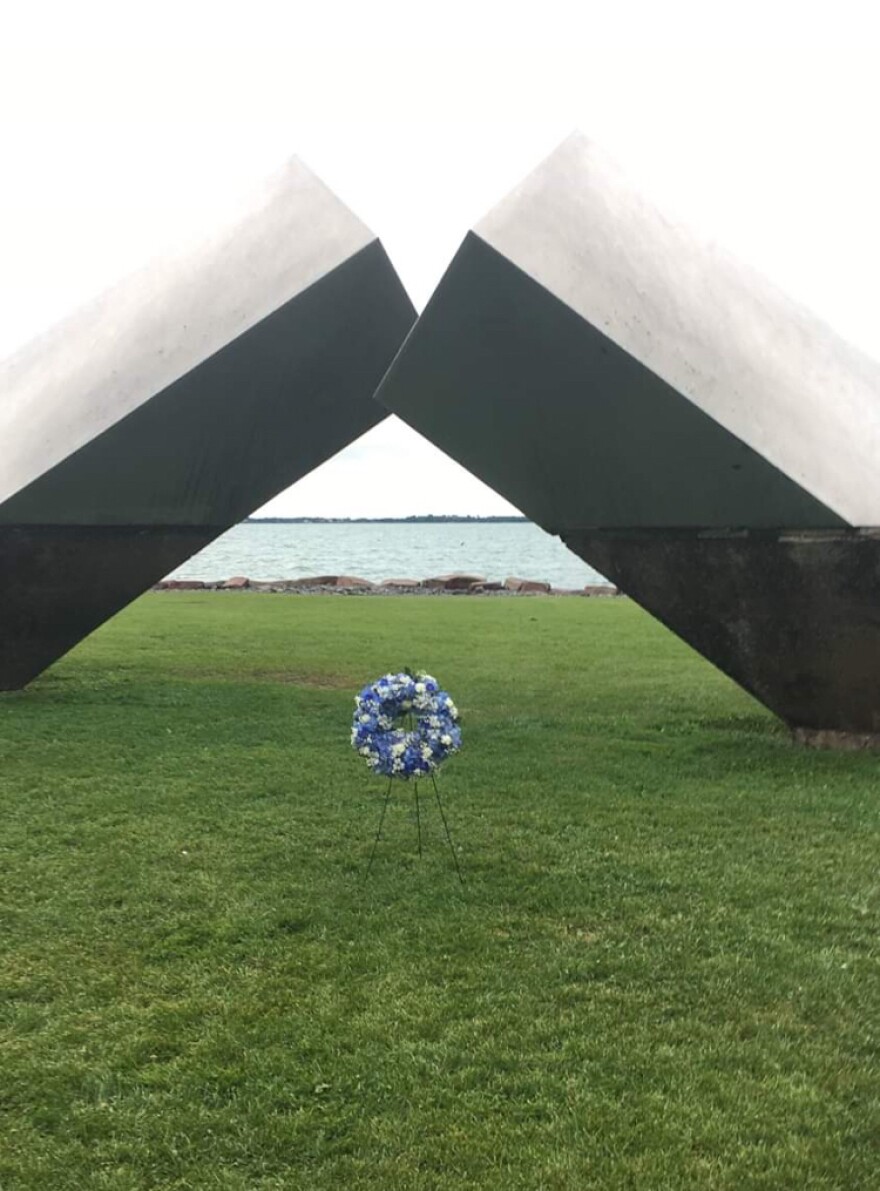My name is Stuart Crawford Hult. On Sept. 11, I was at my desk, at my office at 5 World Trade Center, eighth floor, working as the vice president of information technology for Credit Suisse First Boston. I was a Williston resident, commuting weekly back and forth to New York City.
This story is part of VPR’s 9/11 remembrance project, featuring the voices of Vermonters reflecting on how their lives were changed by 9/11. To find the full project, go to www.vpr.org/911.
I had been at my desk for about 20 minutes and I was checking email, and I heard a loud boom explosion outside of my window. Then I felt reverberations through the floor, the walls; the window of my office was shaking.
I stood up, went to the door, and I saw people just frozen at their desks. I looked back towards my window, and I saw large amounts of debris coming down outside of the window, raining down onto the streets, and I saw people outside my window running east.
It was time to get out.

I grabbed my briefcase — it had my wallet in it, I knew I was going to need that. And I proceeded to exclaim, for everybody, at the top of my lungs, to get the f*** out. And I ran around the floor, screaming that, until everybody had left the floor. I did another sweep. I pulled the fire alarm on the way out; nothing happened.
And then it was into the stairwell.
I had grown up in a household that was ravaged by World War II-related post-traumatic stress syndrome, in that of my dad, who was a sergeant major in the U.S. Army Medical Corps in World War II. I heard a lot of screaming when I grew up. And sometimes having a loud voice can be a tool.
So, instead of a curse that day, it turned into a blessing. I screamed my head off.
So, after I was confident that I checked every office, around every cubicle and space, I ran for the exit myself.
When I got out of the building, I went east. Approximately, about a block and a half, I finally stop and turn around. The noise is deafening from the air horns and the sirens.
There's a second explosion at World Trade, over my head, and it's the largest fireball I've ever seen in my life — mind you, I've never seen a lot of fireballs — and it was massive. And at that moment, I thought the world was going to end.
There was a moment, as I had to turn and decide, “You need to get out of this area.”
"The area's very hard to return to. And I was dealing with a lot of pain; I was self-medicating with alcohol. I had undiagnosed post-traumatic stress syndrome. And I finally got sober seven years ago, on Aug. 5, and I look after my mental health."Stuart Crawford Hult
I'm like, “Is there anything you can possibly do to help these people?” And in the midst of all these sirens, and all these cars, and everybody responding.
And the thought was: “You can't. You're going to be in the way and you might be putting yourself in danger.”
And the other thing occurred to me about my dad. I knew things were gonna get bad after that second explosion. I didn't know how bad they were going to get. And I remembered my dad and his troubles with post-traumatic stress syndrome, and how it troubled him from his years in the war, in World War II.
And I thought: “You know, there are images here that you're not going to want to have etched in your brain for the rest of your life.” You know, God bless those that do and have to deal with it every day.
I was able to make my way back to my apartment on 43rd Street.

The next morning, I woke up to the news of the amount of casualties, of people that were missing. And of course it wasn't accurate, but it was being updated. But it was at that moment that I realized that the firehouse, Fire Department Rescue Company 1, right next to my building, had lost everybody on duty that day.
There were 11 souls — one lieutenant, one captain, nine firefighters — from Rescue 1 that were lost.
And I absolutely lost control; wailed. And the severity of the amount of people, of rescue workers … and my heart goes out to the families of the victims, the survivors, the cleanup workers and those that are still fighting for their benefits, as well.
Dealing with it, going forward? After that, we went back to work. Not a lot of it was mentioned. I didn't return below 14th Street until I had a business meeting down there in 2003.
The area's very hard to return to. And I was dealing with a lot of pain; I was self-medicating with alcohol. I had undiagnosed post-traumatic stress syndrome. And I finally got sober seven years ago, on Aug. 5, and I look after my mental health.
And I was able to return to the firehouse that lost everybody, that had been on duty that day. I went to a ceremony they had in 2019. And it was a very healing process, 'cause I used to walk by that firehouse every day. I'd walked by it that morning, before they all went to World Trade 1, where they were.
And so I was able to return there, and they greeted me with open arms. And I send a wreath to that firehouse now, every year, to make sure that they are remembered.
Have questions, comments or tips?Send us a message or tweet us@vprnet.






